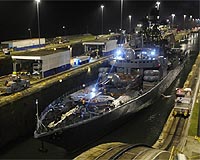| . |  |
. |
Beijing (AFP) Dec 21, 2009 The fraught climate change talks in Copenhagen have shown that the concept of a "G2" that would see China and the United States ruling global affairs is far from reality, analysts said Monday. The accord reached last week in Denmark after marathon negotiations has been widely criticised as a failure, and much of that ire has been directed at China and the United States, the world's two largest carbon polluters. The global powers sparred often at the talks, failing to agree on several key issues, including that of how to verify that emerging economies such as China fulfil their pledges to crack down on greenhouse gas emissions. "If there is proof times four that there is no G2, it's the Copenhagen conference," said Jean-Pierre Cabestan, professor of political science at Hong Kong Baptist University. "Nothing can be done without the others." Shi Yinhong, a political expert at Renmin University, agreed. "I think that on the one hand, China's position and importance have increased much more, and consultation between the US and China was quite important," said Shi. "But on the other hand, if you talk about G2 in Copenhagen, you can see G2 confrontation on some very important issues, so I don't think that the G2 is a correct concept." The idea of a special US-China relationship, dubbed the G2, has been floated in American academic circles since 2006. It was raised again in January by former US national security adviser Zbigniew Brzezinski in Beijing as the world's largest and third-largest economies celebrated 30 years of diplomatic ties. The concept again attracted interest following the G20 meeting in April in London, where US President Barack Obama and China's Hu Jintao launched an annual strategic dialogue and agreed to "strengthen ties at all levels." But experts said the Copenhagen talks had highlighted the fact that the two sides remain far apart on a number of issues. Russell Leigh Moses, a Beijing-based analyst, said the verification of emissions cuts in particular had displayed a key sticking point in relations between Beijing and Washington. "There's still anxiety that the United States is out to contain China," he said. "It also has to do with domestic consequences -- how do you tell local governments that not only are you going to be overseen by Beijing in terms of economic growth... but you're also going to be overseen by other countries?" Beyond that, the Copenhagen summit also illustrated that China was still trying to work out what role it wanted to play in the world, Moses said. "Do you want to be a G2, a G8, do you want to be the only superpower in the world?" he said. For Shi, the conflicts seen at Copenhagen between the United States and China signalled the beginning of a difficult period for relations between the two nations. "If we consider the Sino-American conflicts in Copenhagen, the potential new arms sales to Taiwan and Obama's potential meeting with the Dalai Lama, relations will have more difficulties in the next few months," he said. The United States could reportedly soon sell a new batch of arms to Taiwan -- a move that would anger China, which considers the island nation part of its territory. White House aides have also said that Obama would meet with Tibet's exiled spiritual leader the Dalai Lama "at an appropriate time" after the US leader's November visit to China -- another move which would raise hackles in Beijing. Commercial ties between the world's largest and third largest economies have been frayed in recent months, with the capitals trading accusations of unfair trade practices. Another potential irritant could be the trial this week of leading Chinese dissident Liu Xiaobo on subversion charges -- the United States has already urged Beijing to free Liu and end the harassment of political prisoners. "Relations (between the United States and China) will remain difficult," said Cabestan. "This shows that Obama's visit to China was a bit of a waste of time -- it was a formality but actually masked important differences." Share This Article With Planet Earth
Related Links Learn about the Superpowers of the 21st Century at SpaceWar.com Learn about nuclear weapons doctrine and defense at SpaceWar.com
 20 years later, Panamians reflect on US invasion
20 years later, Panamians reflect on US invasionPanama City (AFP) Dec 20, 2009 Twenty years after the United States invaded Panama and captured dictator Manuel Noriega, many Panamanians say the intervention was a US move to remove a "hindrance" to its political agenda. The United States maintains that the invasion, which began on the morning of December 20, 1989 under US president George H.W. Bush, sought to depose general Noriega to bring him to justice for his role ... read more |
|
| The content herein, unless otherwise known to be public domain, are Copyright 1995-2009 - SpaceDaily. AFP and UPI Wire Stories are copyright Agence France-Presse and United Press International. ESA Portal Reports are copyright European Space Agency. All NASA sourced material is public domain. Additional copyrights may apply in whole or part to other bona fide parties. Advertising does not imply endorsement,agreement or approval of any opinions, statements or information provided by SpaceDaily on any Web page published or hosted by SpaceDaily. Privacy Statement |